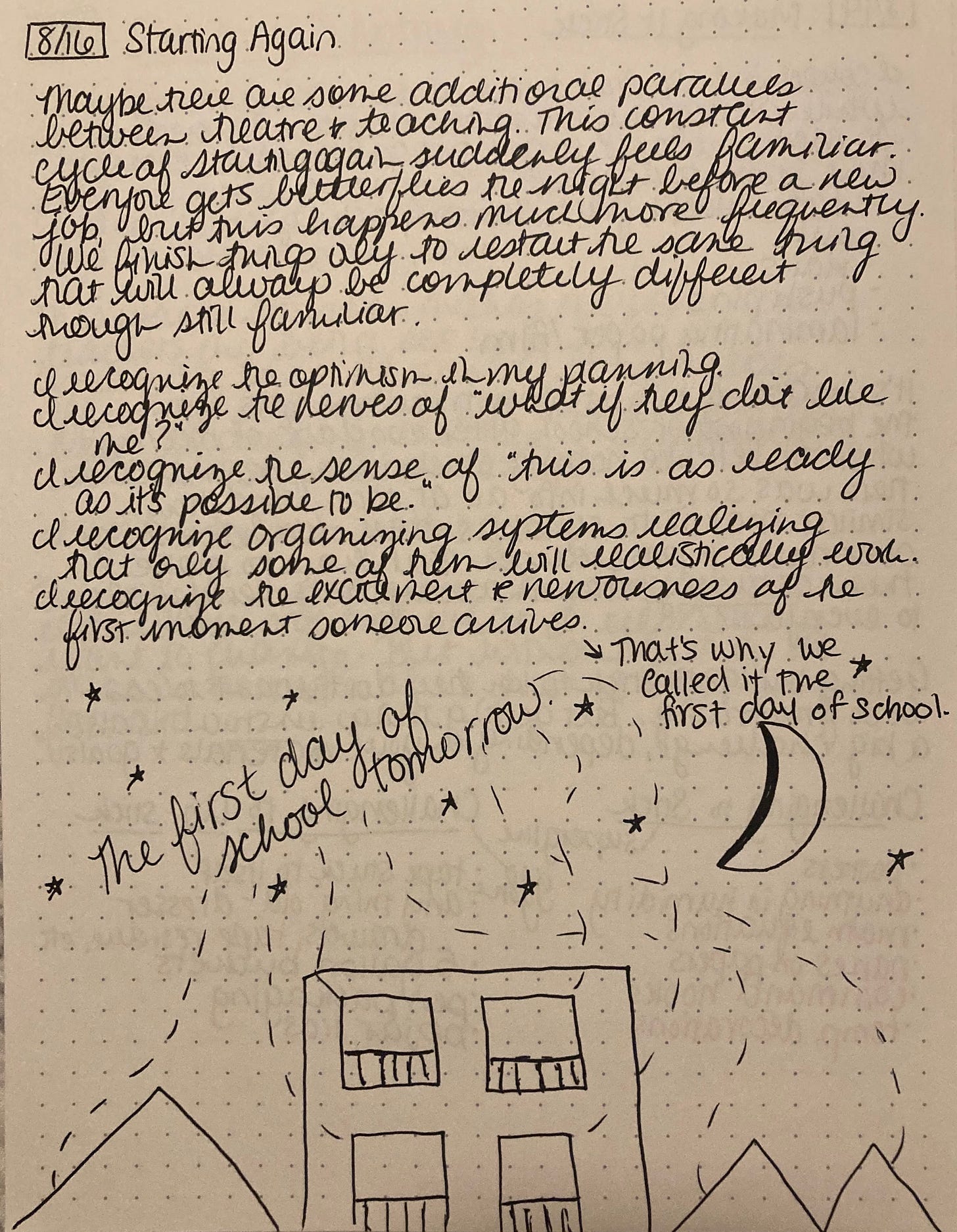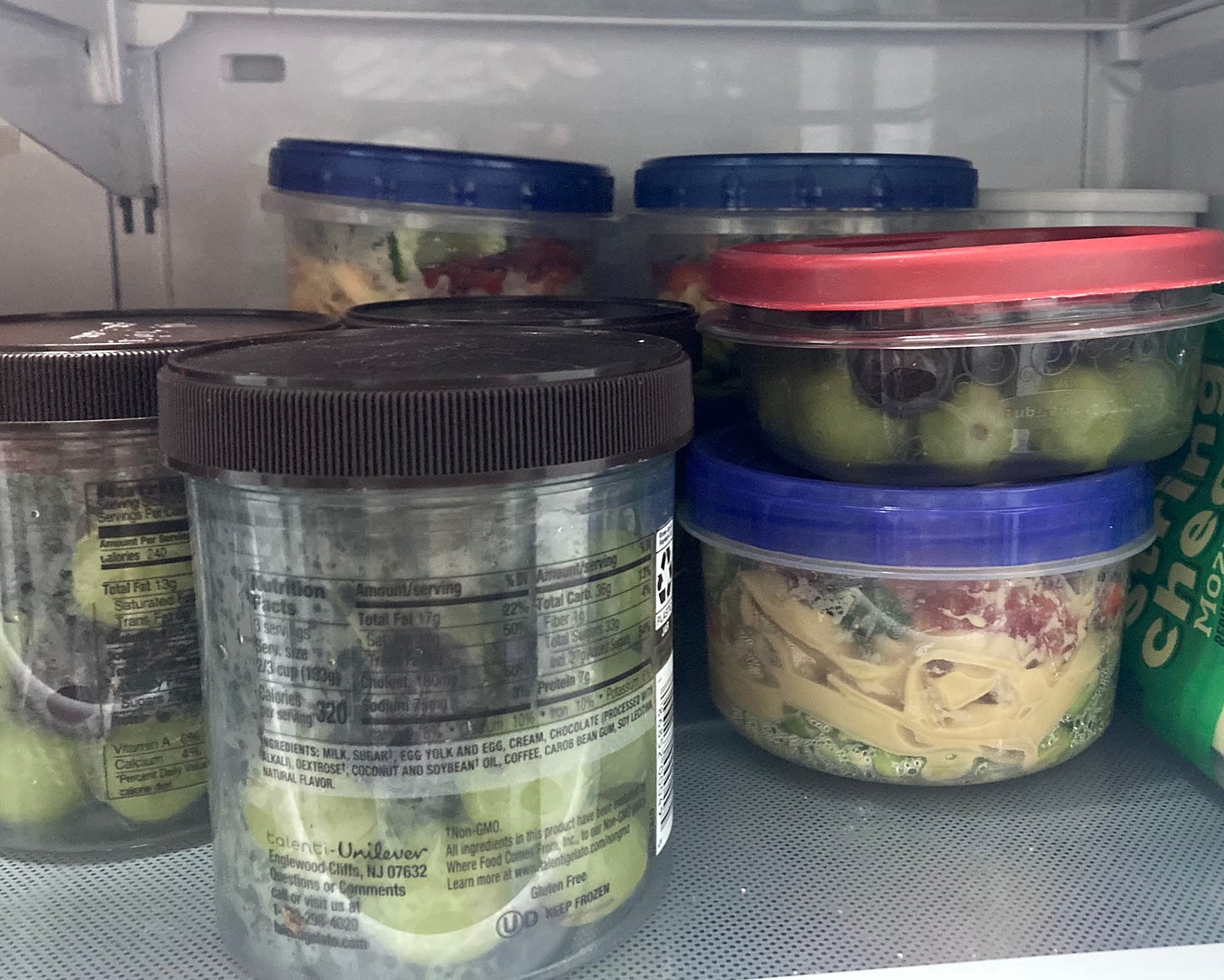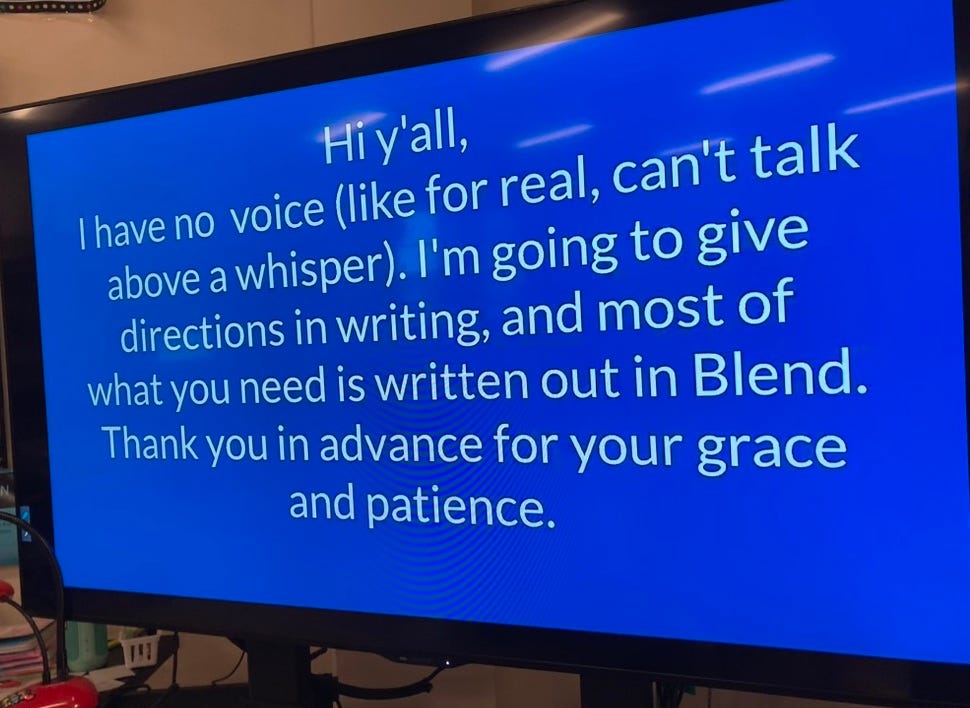
School starts tomorrow. Even if I wasn’t teaching new content and a new grade level, I would still be nervous, still be sure I’ve forgotten something critical, still have a hard time sleeping. And tomorrow, I will still not know how to read the schedules perfectly, will still pronounce names wrong (though I will only do it once and will apologize profusely), will still not know why someone gave me the proverbial keys to a hive of human activity. I know now that, despite all of that, it will be okay, and within a few weeks, the routine will be predictable and mostly manageable most days. But tonight…try telling that to my nervous system!
I have a love/hate relationship with summer vacation and time off in general. I always think that my brain needs lots of downtime, lots of alone time, lots of quiet. And I do revel in those days - a few of them. Then I kind of turn into a gremlin for whom isolation is like being fed after midnight. I have been deeply resistant the past two weeks to going back to a routine, but I also feel more awake than I did through most of July, coming back, however hesitantly, to a life that looks really different during the academic year.
In professional theatre (my former career), we called the first day of rehearsal “the first day of school.” The vibe was very similar - lots of excitement, lots of nerves, lots of sizing other people up, the sensation of never, ever, no matter how hard you tried, being ready. The industries are surprisingly similar. Like theatre, school has cycles with long breaks (desired or not). Like theatre, school requires a kind of superhuman ability to build relationships and build them quickly, and an equal ability to let them go at the end of a pre-determined amount of time, whether you are ready or not. In both spaces, you are trying to do more with less, always, and you are there because you WANT to be there in one inarticulable way or another (because there are easier jobs that pay way more in both cases if you don’t). There are key differences, of course, and ones significant enough that, even on my toughest teaching days, I have zero desire to go back to working in nonprofit theatre. But I will never stop feeling like theatre prepared me to teach public school, even if that’s not what it’s designed for or what I thought I was doing it for.
My least favorite part of going back to school is meal prepping. My relationship with food is rocky at best; in college, I got really sick for a really long time for no discernible reason. I hate feeling nauseous more than I hate just about anything, and I felt that way any time I ate anything for six months, and was generally queasy for the next two years even after I started forcing myself to eat “real” food (meaning anything beyond crackers, apple juice, and thin-sliced turkey) again. To pull myself out of that hole, I had to force myself to eat like clockwork every two hours, and I had to plan meticulously, especially on a college and a theatre schedule. My need to meal prep is intertwined with a kind of dread of what will happen if I don’t have enough planned, even though, fortunately, my health lives in a world now where such rigid schedules aren’t as necessary.
It was also during this period that I started going to yoga consistently-ish. Nothing was making me feel better, and yoga seemed like a random but harmless choice of other things to try. It got me off campus in a group of people who didn’t know I was sick. It also gave me a way to focus my mind on literally anything besides how awful I felt, and sometimes, that feeling lasted all the way from the end of an evening class until I went to bed, which meant I found 12-hour stretches where I felt okay-ish, a significant improvement. Over time, it helped me think about what my body could do that was positive, not just what it was doing that was making me miserable.
My yoga practice will always be tied to this period of my life. Some days, I hate this, hate that I’m constantly reminded of living through my own personal hell. But most days, I’m grateful. Grateful that there was a studio within walking distance, grateful that I could afford their sliding-scale classes, grateful that I managed to keep going for long enough to feel the benefits. Grateful that I’ve managed to find yoga homes almost everywhere I’ve lived since then, whether those were studios or content creators or simply mantras that I wrote on Post-It notes where I’d see them regularly. Grateful that, more often than not, I still feel better after practicing, even when the class is rough or I can’t quiet my mental chatter. It’s enough to keep coming back to something that will likely help whatever feels wrong, even something as big as the most significant Sunday scaries of the year.
A part of yoga that I returned to this year after over a decade was verbal mantras. Like inversions and arm balances, I accepted them early in my practice because I didn’t know enough to question them or feel self-conscious about them; people were chanting in Sanskrit, so I chanted. The instructions were to silently repeat a mantra in English during savasana, so I did. Teachers said to go into plow, so I tried. The results of these practices were mixed (and I should have thought more carefully about some of the postures I attempted without having the strength and flexibility to do them correctly), but overall, I gained a lot by simply doing without overthinking it. After I left the city with the studio where I was exposed to these elements, I didn’t try any of them again for a long time.
And then there was this winter. I was finishing my 300 hour training during the hardest professional stretch I’ve ever had, and I was using a week that I didn’t have a voice (yes, the whole week) to catch up on my coursework because it didn’t involve talking. One of the courses included the Lokah Samastha mantra, chanted and accompanied by harmonium by a former professional musical theatre performer. Even though I didn’t have a voice to chant, listening to those sounds combined with the idea of wishing everyone everywhere to be without suffering, shifted something. I started listening to this mantra, or one of a handful of others whose English translations resonated with me (I am still very much a beginner in terms of seed sounds and frequencies of vibrations and the subtle body - that’s a whole other lifetime of learning) as part of my before-school stave-off-the-anxiety routine, and was surprised by how much different I felt on days I listened to them than on days I didn’t.
Of course, we know that music can put us in (or get us out of) a mood. As a deeply auditory learner, I know that hearing something makes it real in a way that thinking about it does not. There is emerging science (note: not comprehensive research on my part) about what chanting or even listening to vibrations can do to and for our nervous systems, confirming what practitioners of yoga and a variety of other spiritual traditions have known for hundreds if not thousands of years.
And still…it can feel uncertain, kind of like the get-to-know-you games on the first days of school; I know I feel better when I do them, but they also feel exposed and strange and maybe a little cringey depending on who I’m talking to. I’m not sure if these mantras are mine to chant (which is part of why I often listen instead). I am sure that this practice conflicts with my sense of myself, and others’ sense of me, as a no-nonsense executor of details, someone grounded in logic before anything else.
But conflicting truths can exist simultaneously, and there’s no way that I’m starting my day tomorrow without listening to a mantra. I rediscovered “the Ganesh mantra,” “Om Gam Ganapataye Namaha,” in the past few weeks. Ganesh is a Hindu god, the destroyer of obstacles, helping individuals let go of things that are no longer serving them. I’ve experienced this mantra primarily in my teacher’s New Year’s Eve workshops, but hadn’t thought of it as an option for welcoming other new beginnings until recently. In thinking about those epic Sunday scaries and letting go of some of the challenges of last year to embrace the promise of this one, it feels eminently relevant.
One of my favorite recorded yoga practices is called Return. Adriene poses the question “What do you want to return to?” as a means of setting an intention, and both the asana sequence and the question are one that I come back to over and over again. It, just like the Ganesha mantra and every breath we take, are great reminders that every moment can be a new one, a new opportunity for a new beginning, however intimidating a new beginning might be.
September classes are here! I may add a few more, but can commit to these two at the moment!
You can register for classes HERE. You’ll get a calendar request after you do with a Zoom link and a password!
I’d love to hear what you are starting for the first time or finding a way to return to!








